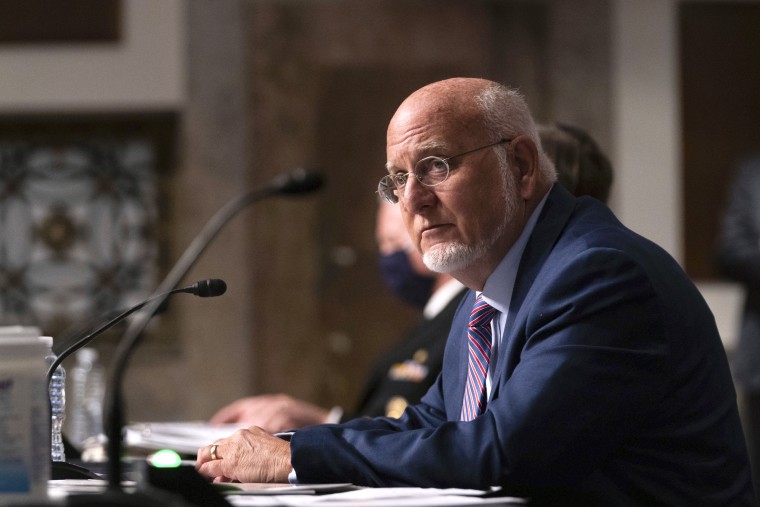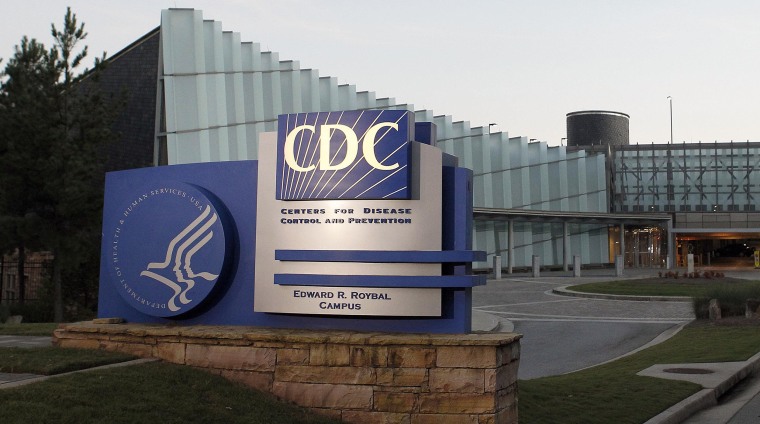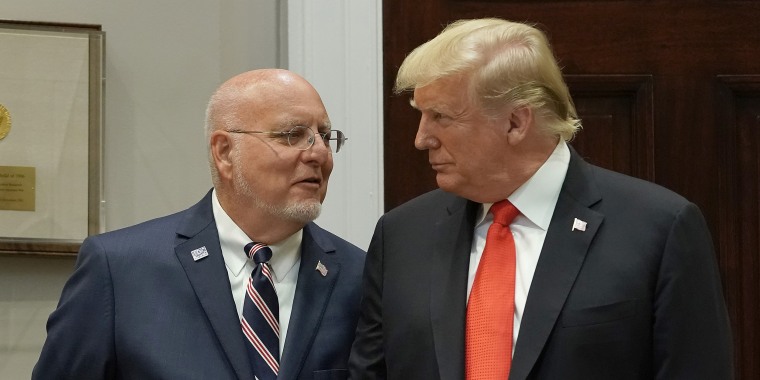Months of mixed messages, political pressure and public gaffes about Covid-19 have caused morale at the Centers for Disease Control and Prevention to turn "toxic," said four current and two former CDC staffers, one of whom said the election could be a "tipping point" for a mass exodus if President Donald Trump wins.
"The house is not only on fire," said a veteran CDC staffer who did not want to be named for fear of retribution. "We're standing in ashes."
Current and former CDC employees said that career staffers are still struggling to influence key decisions about the pandemic as new daily Covid-19 cases soar nationwide but that they are overruled by Trump appointees when politics intrudes.
Most recently, they said, they wanted to extend the "no sail" order for cruise ships through February. It had been set to expire four days before the Nov. 3 election. Instead, they say, Vice President Mike Pence's office pushed for the order to expire, which stands to benefit 21,000 cruise industry workers in the swing state of Florida.
The dispute between the White House and the CDC over the cruise ship order was first reported by ProPublica.
A White House official said that when the CDC proposed an extension of the "no sail" order, it seemed "arbitrary" and "they provided no metrics or data as to why."
The White House official said that Pence, Health and Human Services Secretary Alex Azar and CDC Director Robert Redfield hosted a call with the cruise lines to discuss their plan two or three weeks ago and that "discussions about lifting no sail are currently in front of them" but that no decision has been made yet.
The political pressure has taken its toll on CDC employees, the current and former staffers said. A current staffer said that during a recent Zoom call, a supervisor went so far as to instruct CDC staff members to be loyal to the Constitution, not to the president.
Another current employee said: "I don't know if the damage to our reputation can be overcome with a new administration. I worry it's a permanent problem."
White House spokesperson Brian Morgenstern denied that political pressure had influenced decisions about pandemic response.
"President Trump's coronavirus response is about saving lives, not politics," he said. "The CDC occupies a critical seat on the Task Force, which provides appropriate attention, consultation, and input on coronavirus-related matters. Through the administration's historic efforts, we are delivering testing and supplies to protect vulnerable populations, PPE and ventilators across the country, guidance to schools and businesses, and safe and effective treatments and vaccines in record time."
A 'shrill voice'
Before the pandemic, according to a former official, the CDC would regularly post guidance about public health issues on the agency's website without White House approval.
After the pandemic was declared in March, White House staffers got on the phone to CDC headquarters in Atlanta demanding web administrator credentials to independently edit the website, the former official said. According to the former official, the CDC ultimately denied access, but officials have since then been consistently overruled as they push agency guidance through the Washington approval process.
A current CDC staffer who did not want to be named out of fear of retribution said the administration pushed CDC staff members in mid-April to say that reopening churches was safe. "I told them I will not be involved in putting out [church] guidance where we have evidence that [Covid-19] can be transmitted by passing a collection plate and singing — as we knew had happened in Chicago," the staffer said.
According to the staffer, members of the relevant team took a firm stance against interference. "If the guidance gets changed, it gets changed above us — that's the line — we said that," the staffer said. "We said we have scientific basis that it's not safe to reopen churches."
By April 25, White House staff members had told CDC staffers, Office of Management Budget and HHS officials to get on a conference call to discuss reopening guidelines, including those involving houses of worship, and they were "screamed at by White House deputies," according to an official who was on the call. While the call addressed a number of reopening guidelines about which the White House was concerned, the official said White House deputies were especially worried about guidance that could upset churches and the president's church-going base.
"I'll never forget the shrill voice screaming at me, 'My job is to protect the president from pissing off his constituency,'" the official said. The official said a White House deputy took CDC officials to task for their wish to advise houses of worship to refrain from singing and standing shoulder to shoulder.
Additional internal emails reviewed by NBC News showed that CDC staffers were admonished for early drafts of guidelines written in the spring that advised houses of worship against holding in-person gatherings.
"This declaration/command in a CDC doc will be read as authoritative by local enforcers and could cause people of faith to be vilified/prosecuted for exercising their faith," representatives of HHS wrote to the CDC in April. "The federal government has no authority to do so. ... The CDC must be more vigilant to not burden the free exercise of religion."
The push throughout April for politics over public health on the part of White House officials stunned career CDC staffers.
"I fear we are bordering on not following the science," a concerned staffer wrote in an internal CDC e-mail in April, referring to White House pressure to refrain from offering churches specific guidelines.

The dispute over public health guidance for churches was originally reported by The Wall Street Journal.
In an email, Morgenstern, the White House spokesperson, said: "American families and communities want their churches to safely reopen, and it is a fundamental Constitutional right to worship without undue government interference. The administration will continue to work with states to ensure that congregations are properly protected as restrictions are eased responsibly."
The CDC ultimately published guidance titled "Considerations for Communities of Faith" on May 22, but the guidelines did not mention singing. Rather than prohibit collection plates, the guidance suggested, "Consider a stationary collection box ... or electronic methods of collection ... instead of shared collection trays or baskets."
The house is not only on fire. We're standing in ashes.
CDC officials also expressed concern in meetings in April that members of the White House team were exerting pressure to reopen theme parks and overnight camps, which they described as "strange" and premature requests in light of the public health crisis.
By summer, the current and former staffers said, most attempts by the CDC to post coronavirus guidance had become weekslong efforts bogged down by an approval process that included officials at HHS, OMB, the Office of Information and Regulatory Affairs, the White House Domestic Policy Council, the Office of the Vice President and sometimes Trump advisers Peter Navarro and Kellyanne Conway. "It's a ginormous clusterf---, because no one is in charge," the former official said.
For midlevel managers, the back and forth created a dizzying number of edits. Sometimes there would be 150 versions of the same guidance document, according to two sources familiar with the matter. A current staffer said time-consuming arguments included whether or not to use the terms "mask" or "cloth face covering."
"There is tremendous frustration over the interagency review process," a CDC staffer wrote in an email dated April 23.

Two CDC veterans said that, for years, the CDC's dissemination of information to the public went through a number of regimented steps, requiring numerous officials from different parts of the agency to sign off on information before it made its way to the CDC website. That kind of "cross clearancing" is no longer routinely happening, they said, which means unvetted information sometimes goes public.
"That's layers and layers and layers of review that no longer happen," said a source, who worked exhaustively on previous global outbreaks, including the Ebola virus. "What's happening now is unprecedented."
A current member of one of the CDC advisory committees who did not wish to be named agreed that within the CDC, staffers are afraid to speak up and are "keeping their heads down for the benefit of the world." The source said those people "have chosen to devote their careers to public service, and it never occurred to them that there would be this degree of public involvement."
An official who has worked for the CDC for more than 10 years said that even though she has never seen morale so low, many staffers are afraid to leave, knowing their positions could be filled by people with political agendas or without public health backgrounds.
"It is a real fear — every person who leaves gives them an opportunity to put another person in," she said.
Two sources confirmed that the White House brought in a pair of political appointees, Nina Witkofsky and Trey Moeller, in August by to keep an eye on the work of Redfield, the CDC's director. The role of the appointees was first reported by The Associated Press.
An administration spokesperson said Witkofsky and Moeller began working at the CDC in June "as senior advisers reporting directly to Dr. Redfield."
"They started their current roles, as acting chief of staff and acting deputy chief of staff, after the resignation in August of the former COS and his deputy," the spokesperson said.
The toll on the agency's credibility hasn't hurt the agency's role with the state agencies, said Mike Fraser, who runs the Association of State and Territorial Health Officials. He said that the scientists are still regularly consulted through back channels but that he finds that the agency is out of the loop. "They are good people, they are telling the truth, but no one in Washington cares — they are left powerless," he said.
Dr. Philip Graitcer, who worked at the CDC for 22 years and left in the mid-1990s, was one of the signers of an open letter this year raising concerns about "ominous politicization" at the agency. Graitcer, whose son now works for the agency, was a member of the Epidemiology Intelligence Services, working to fight swine flu and Legionnaires' disease.
"The biggest thing you need in an epidemic is leadership and truth," he said. "If you don't have that, you can't even begin to talk to the public about it."
CORRECTION (Oct. 25, 2020, 10:30 p.m. ET): A previous version of this article misstated when medical professionals issued an open letter criticizing what they called the politicization of the Centers for Disease Control and Prevention. The letter was issued May 30, not last week.



